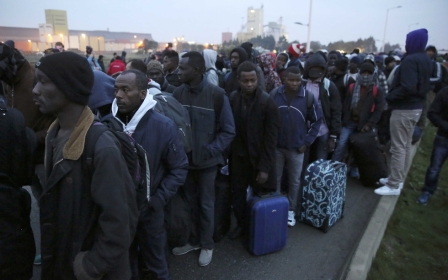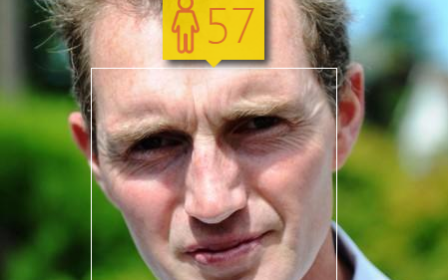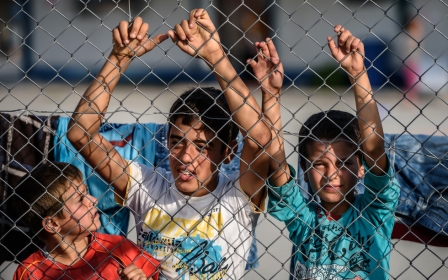French authorities tearing down Calais refugee camp

In one of the tents due to be demolished in the windswept Calais "Jungle" camp in northern France, the refugees and migrants who once lived there had left behind several loaves of bread and a milk carton.
Outside they had also abandoned the clothes that were drying on a washing line slung between a tree and a pole, suggesting they had left in a hurry.
Arabic graffiti scrawled on the side of another tent, among one of the first to be torn down, said: "You may be able to find safety in a temporary homeland, but you cannot build a life."
All that remained of this section of the camp - which once housed hundreds of people hoping to reach Britain - was a pile of mattresses, blankets, clothes, pots, plastic bags and suitcases, dumped by demolition workers on top of the debris from the wrecked tents and huts.
Elsewhere in the "Jungle," the remaining inhabitants attempted to carry on as normal before reluctantly leaving, or making a final stand against their removal.
French workers began demolishing the camp on Tuesday, wielding sledgehammers to tear down makeshift dwellings.
Police equipped with water cannons stood guard over the demolition, while hundreds of migrants - some of whom have lived in the scrubland on the northern French coast for months or years - waited for buses to take them for resettlement across France.
"The migrants have known for a long time this was going to happen," the Calais region's prefect, Fabienne Buccio, told Reuters after arriving at the camp escorted by between 150 and 200 riot police.
"We are making sure it is done properly. We define an area, and then we go in."
One group of young men from Sudan gathered around a small fire they had lit to stay warm, smoking a water pipe.
"We are leaving tomorrow morning," said one of the men as he smoked.
After being processed, 1,636 left on Tuesday, bringing the total to 4,014 since the start of the week, according to Interior Minister Bernard Cazeneuve.
But despite French efforts to clear the camp, some migrants are refusing to budge.
"They can detain me, jail me, throw me out on the street. I still want to go to Britain." -18-year-old Sudanese migrant
For many of the migrants from Syria, Afghanistan and other conflict zones, the closure of the "Jungle" marks the end of a dream to reach Britain, which lies a short sea crossing away.
"Why has Britain abandoned us? How will France house so many thousands? We want to go to Britain. I am not leaving the camp until the French police come here and force me out," said Sudanese 18-year-old Ali Othman, smoking a cigarette outside his tent.
"Whatever the French police do to me I will not apply for asylum here. They can detain me, jail me, throw me out on the street. I still want to go to Britain."
In the town centre, business owners reflected on what the camp, which has existed in a makeshift form since 2002, has meant for them.
Ali Charfa, the owner of a restaurant in central Calais - the closest point on continental Europe to the UK mainland - said that British people had avoided the town because of the "Jungle".
"I have been in Calais 25 years. I moved here from Paris because I heard you could make a lot of money here, because of all the business the Channel crossing and the construction of the Eurotunnel would bring," he said. "The migrants have never done me any harm."
He added that people in Britain only think of Calais as the camp, which keeps them away from the town.
"I think the situation will improve a little - [it] will never be what it once was, but will be better than now,” Charfa said.
"The problem in the long run will not improve, though. They want to be in Britain. That will not change. They will come back one day."
New MEE newsletter: Jerusalem Dispatch
Sign up to get the latest insights and analysis on Israel-Palestine, alongside Turkey Unpacked and other MEE newsletters
Middle East Eye delivers independent and unrivalled coverage and analysis of the Middle East, North Africa and beyond. To learn more about republishing this content and the associated fees, please fill out this form. More about MEE can be found here.




